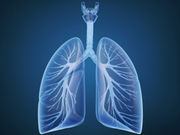Early administration may block viral infection in type-1 alveolar epithelial cells
MONDAY, Feb. 27, 2017 (HealthDay News) — Two medications used to treat asthma and allergies may help prevent a particularly dangerous form of pneumonia caused by influenza A virus (IAV) infection, according to a study published online recently in PLOS Pathogens.
In an effort to examine the contribution of alveolar macrophages in regulating the severity of IAV infection, Amber Cardani, Ph.D., from the Beirne B. Carter Center for Immunology Research at the University of Virginia in Charlottesville, and colleagues employed a murine model in which the Core Binding Factor Beta gene is conditionally disrupted in myeloid cells.
The researchers found that these mice exhibit a selective deficiency in alveolar macrophages; the deficient mice developed severe diffuse alveolar damage, lethal respiratory compromise, and consequent lethality following IAV infection. In these mice, lethal injury resulted from increased infection of type-1 alveolar epithelial cells (T1AECs) and the elimination of infected T1AEC by the adaptive immune T-cell response. Further analysis indicated suppression of the cysteinyl leukotriene (cysLT) pathway genes in T1AECs mediated by alveolar macrophages in vivo and in vitro. In a T1AEC cell line, inhibition of the cysLT pathway enzymes reduced the susceptibility of T1AECs to IAV infection. Inhibition of the cysLT pathway enzymes and blockade of the cysteinyl leukotriene receptors in alveolar macrophage-deficient mice correlated with reduced susceptibility of their T1AECs to IAV infection and protection from lethal infection.
“The excitement of this is the possibility of someone coming to see the physician with influenza that looks a little more severe than usual and treating them with the drugs Singulair or Accolate and preventing them from getting severe pneumonia,” a coauthor said in a news release.
Copyright © 2017 HealthDay. All rights reserved.








